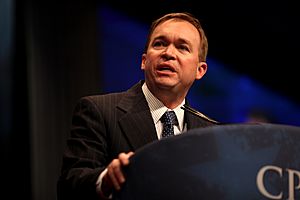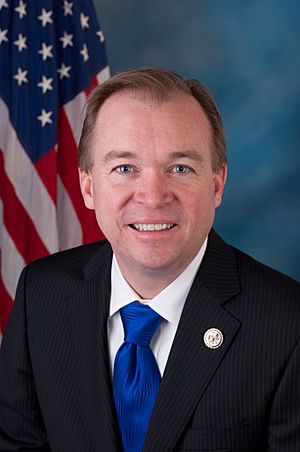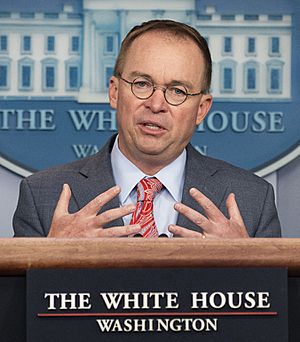Mick Mulvaney facts for kids
Quick facts for kids
Mick Mulvaney
|
|
|---|---|

Official portrait, 2017
|
|
| United States Special Envoy for Northern Ireland | |
| In office May 1, 2020 – January 6, 2021 |
|
| President | Donald Trump |
| Preceded by | Gary Hart |
| Succeeded by | Joe Kennedy III |
| White House Chief of Staff | |
| Acting January 2, 2019 – March 31, 2020 |
|
| President | Donald Trump |
| Preceded by | John F. Kelly |
| Succeeded by | Mark Meadows |
| 41st Director of the Office of Management and Budget | |
| In office February 16, 2017 – March 31, 2020 |
|
| President | Donald Trump |
| Deputy | Russell Vought |
| Preceded by | Shaun Donovan |
| Succeeded by | Russell Vought |
| Director of the Consumer Financial Protection Bureau | |
| Acting November 25, 2017 – December 11, 2018 |
|
| President | Donald Trump |
| Deputy | Leandra English Brian Johnson (acting) |
| Preceded by | Leandra English (acting) |
| Succeeded by | Kathy Kraninger |
| Member of the U.S. House of Representatives from South Carolina's 5th district |
|
| In office January 3, 2011 – February 16, 2017 |
|
| Preceded by | John Spratt |
| Succeeded by | Ralph Norman |
| Member of the South Carolina Senate from the 16th district |
|
| In office January 3, 2009 – January 3, 2011 |
|
| Preceded by | Chauncey K. Gregory |
| Succeeded by | Chauncey K. Gregory |
| Member of the South Carolina House of Representatives from the 45th district |
|
| In office January 3, 2007 – January 3, 2009 |
|
| Preceded by | Eldridge Emory |
| Succeeded by | Deborah Long |
| Personal details | |
| Born |
John Michael Mulvaney
July 21, 1967 Alexandria, Virginia, U.S. |
| Political party | Republican |
| Spouse |
Pamela West
(m. 1998) |
| Children | 3 |
| Education | Georgetown University (BS) University of North Carolina, Chapel Hill (JD) |
John Michael “Mick” Mulvaney (born July 21, 1967) is an American politician. He held several important jobs in President Donald Trump's administration. He was the director of the Office of Management and Budget (OMB) from 2017 to 2020. He was also the acting White House Chief of Staff from 2019 to 2020. Before that, he was a member of the U.S. House of Representatives.
As a Republican, Mulvaney served in the South Carolina state government from 2007 to 2011. He was then elected to the U.S. House of Representatives for South Carolina's fifth district, where he served from 2011 to 2017. President Trump chose him to be the OMB director, and the Senate approved him in 2017.
While in Congress, Mulvaney was known for wanting to cut government spending. This idea is called fiscal conservatism. He was even willing to have a government shutdown to achieve this. However, when he was OMB director, the government's debt grew. This was because of both increased spending and tax cuts.
In January 2019, Mulvaney became the acting White House chief of staff. He was involved in a situation where military aid to Ukraine was held back. He said this was partly to get Ukraine to investigate a theory about the 2016 U.S. election.
After the 2021 attack on the U.S. Capitol, Mulvaney resigned from his role as Special Envoy for Northern Ireland. In 2022, he was hired by CBS News as a contributor, which caused some debate. He later joined NewsNation and CNBC.
Contents
Early Life and Career
Mick Mulvaney was born in Alexandria, Virginia. His father was a real estate developer and his mother was a teacher. He grew up in North Carolina and later moved to South Carolina. He went to Georgetown University and graduated with honors in 1989. After that, he earned a law degree from the University of North Carolina at Chapel Hill in 1992.
After law school, Mulvaney worked as a lawyer. He then joined his family's real estate and homebuilding business. He was also a part-owner of a restaurant chain called Salsarita's Fresh Cantina.
South Carolina Politics
In 2006, Mulvaney was elected to the South Carolina House of Representatives. Two years later, in 2008, he was elected to the South Carolina Senate. During his time in the state government, he was recognized for his conservative views. He received an A+ rating from the South Carolina Club for Growth, a group that supports lower taxes and less government spending.
U.S. House of Representatives (2011–2017)
In 2010, Mulvaney ran for the U.S. House of Representatives. He defeated the longtime Democratic representative, John M. Spratt Jr., winning 55% of the vote. He was re-elected three more times in 2012, 2014, and 2016.
During his time in Congress, Mulvaney was part of the Tea Party movement. This was a group of conservatives who wanted to reduce government spending and debt. He was also a founding member of the Freedom Caucus, another group of conservative Republicans in the House.
Key Political Stances
Mulvaney was known for his strong conservative positions. He was against new gun control laws and opposed the Affordable Care Act, a major healthcare law.
He also took a hard line on government spending. He was willing to vote against bills to fund the government if he felt they spent too much money. This sometimes led to the risk of a government shutdown, where many government services temporarily stop.
In 2018, Mulvaney told a group of banking lobbyists that when he was a congressman, he would usually only meet with lobbyists if they had donated money to his campaigns. He said that his own voters from South Carolina were his top priority and could always meet with him.
Office of Management and Budget (OMB)

In December 2016, President-elect Trump nominated Mulvaney to be the director of the Office of Management and Budget (OMB). The OMB helps the president create the federal budget. The Senate confirmed him in February 2017.
As OMB director, Mulvaney was in charge of the Trump administration's budget proposals. These budgets suggested cutting money for some government agencies, like the Environmental Protection Agency, and for social programs. At the same time, the budgets called for more spending on the military and for a wall on the U.S.-Mexico border.
Even though Mulvaney was known for wanting to cut spending, the national debt increased during his time as OMB director. This was due to a combination of tax cuts and new spending plans.
Consumer Financial Protection Bureau (CFPB)
From 2017 to 2018, Mulvaney also served as the acting director of the Consumer Financial Protection Bureau (CFPB). This agency was created to protect consumers from unfair practices by banks and other financial companies.
When he was in Congress, Mulvaney had been a strong critic of the CFPB. As its acting director, he made many changes. He paused hiring, stopped collecting fines from companies, and reviewed all ongoing investigations. He also dropped a lawsuit against a lender that was charging very high interest rates.
These actions greatly reduced the CFPB's power. Supporters of the changes said the agency had too much power before. Critics said the changes left consumers with less protection.
White House Chief of Staff
In December 2018, President Trump named Mulvaney his acting White House Chief of Staff. This is one of the most powerful jobs in the White House, responsible for managing the president's staff and schedule.
Before Trump was elected, Mulvaney had made some critical comments about him, calling him a "terrible human being." Despite this, he became a key member of Trump's team.
Trump-Ukraine Situation
Mulvaney was involved in the Trump–Ukraine scandal. In October 2019, he told reporters that military aid to Ukraine was held back partly because President Trump wanted Ukraine to investigate a theory about the 2016 U.S. election. A few hours later, the White House released a statement saying there was no link between the aid and any investigation.
In March 2020, President Trump announced that Mark Meadows would replace Mulvaney as chief of staff.
Later Career
After leaving the White House, Mulvaney was named the U.S. Special Envoy for Northern Ireland. This role involves working on peace and economic issues in that region.
On January 7, 2021, Mulvaney resigned from this position. He said he was resigning because of the attack on the U.S. Capitol the day before.
In March 2022, CBS News hired Mulvaney as a paid contributor. This decision was met with some debate inside the news network. He has since worked as a contributor for other news channels as well.
Personal Life
Mulvaney is married to Pamela West, whom he met in 1998. They have three children, triplets named Finn, James, and Caroline, who were born in 2000.
Images for kids
-
Speaking at a campaign event for Senator Rand Paul, September 2015
See also
 In Spanish: Mick Mulvaney para niños
In Spanish: Mick Mulvaney para niños
- Timeline of investigations into Trump and Russia (2019–2020)
 | Selma Burke |
 | Pauline Powell Burns |
 | Frederick J. Brown |
 | Robert Blackburn |




